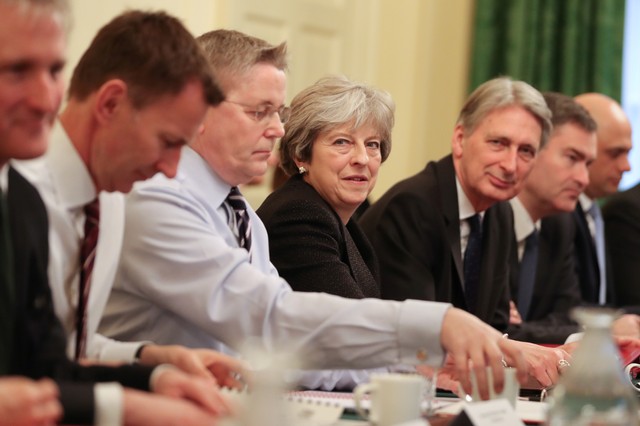London: Rishi Sunak said on Tuesday he was not daunted by the scale of the challenge as he became Britain’s third prime minister in two months, pledging to lead the country through an economic crisis and rebuild trust in politics.
The 42-year-old former hedge fund boss, who has only been in elected politics for seven years, has been tasked with bringing an end to the political infighting and radical changes in policy that have horrified investors and alarmed international allies.
He warned that difficult decisions lay ahead as he looks to cut public spending and fix the “mistakes” that were made by Liz Truss during her short and chaotic tenure in Downing Street, just as the country slides into a recession.
“I fully appreciate how hard things are,” he said outside the prime minister’s residence at Downing Street where he shunned the normal tradition of standing beside his family and cheering political supporters.
“I understand too that I have work to do to restore trust, after all that has happened. All I can say is that I am not daunted. I know the high office I have accepted and I hope to live up to its demands.”
Sunak, one of the richest men in parliament, is expected to slash spending to plug an estimated 40 billion pound ($45 billion) hole in the public finances created by an economic slowdown, higher borrowing costs and an energy support scheme.
With his party’s popularity in freefall, he will face growing calls for an election if he ditches too many of the promises that helped elect the Conservative Party in 2019, when then leader Boris Johnson pledged to invest heavily.
Economists and investors have welcomed Sunak’s appointment – Ryanair boss Michael O’Leary said the adults had taken charge again – but they warn he has few options to fix the country’s finances when millions are battling a cost of living crunch.
Sunak, who ran the Treasury during the COVID-19 pandemic, promised to put economic stability and confidence at the heart of the agenda. “This will mean difficult decisions to come,” he said, shortly after he accepted King Charles’s request to form a government.
Sunak also vowed to put the public’s needs above politics, in recognition of the growing anger at Britain’s political class and the ideological battles that have raged ever since the historic 2016 vote to leave the European Union.
Workers heading towards London’s financial district said Sunak appeared to be the best of a bad bunch and while some wanted an election now others hoped he would stay until the next scheduled election, due by January 2025.
“I think he was competent, and that’s really what we should hope for at the moment,” said management consultant, James Eastbook, 43.
Financial turmoil
Britain’s youngest prime minister for more than 200 years and its first leader of colour, Sunak replaced Truss who resigned after 44 days following a “mini-budget” that sparked turmoil in financial markets.
He will now need to review all spending, including on politically sensitive areas such as health, education, defence, welfare and pensions.
As he made his first speech as prime minister, to the hundreds of journalists gathered in Downing Street, he struck a more sober tone than those of his predecessors, Truss and Johnson.
He paid tribute to Truss and said her plan to reignite economic growth had not been wrong, but he said mistakes were made: “And I have been elected as leader of my party and your prime minister, in part to fix them.”
As Truss left office, applauded by colleagues and staff, she struck a defiant tone and failed to apologise for the market turmoil that accompanied her seven weeks as prime minister, when the pound collapsed and borrowing and mortgage rates jumped.

Former British Prime Minister Liz Truss gives her statement outside Number 10 Downing Street, London, Britain October 20, 2022. Photo: Reuters/Toby Melville
Sunak will now start forming his cabinet, with some Conservative lawmakers hoping he will include politicians from all wings of the party.
He is expected to retain Jeremy Hunt as finance minister after he helped calm volatile bond markets by ripping up most of Truss’s economic programme.
Investors will also want to know if Sunak still plans to publish a new budget alongside borrowing and growth forecasts on October 31, which would help inform the Bank of England’s interest rate decision on November 3.
Political machinations
Sunak, a Goldman Sachs analyst who only entered parliament in 2015, also faces a battle to keep the different factions of his warring party on side.
He was blamed by many Conservatives when he quit as finance minister in July, triggering a wider rebellion that brought down Johnson. Others have questioned how a multi-millionaire can lead the country when millions of people are struggling with surging food and energy bills.
“I think this decision sinks us as a party for the next election,” one Conservative lawmaker told Reuters.
Historian and political biographer Anthony Seldon said Sunak would also be constrained by the mistakes of his predecessor.
“There is no leeway on him being anything other than extraordinarily conservative and cautious,” he told Reuters.
Many politicians and officials abroad, having watched as a country once seen as a pillar of economic and political stability descended into brutal infighting, welcomed Sunak’s appointment.
Sunak, a Hindu, also becomes Britain’s first prime minister of Indian origin.
US President Joe Biden described it as a “groundbreaking milestone”, while leaders from India and elsewhere welcomed the news. Sunak’s billionaire father-in-law, N.R. Narayana Murthy, said he would serve the United Kingdom well. “We are proud of him and we wish him success,” the founder of software giant Infosys said in a statement.














